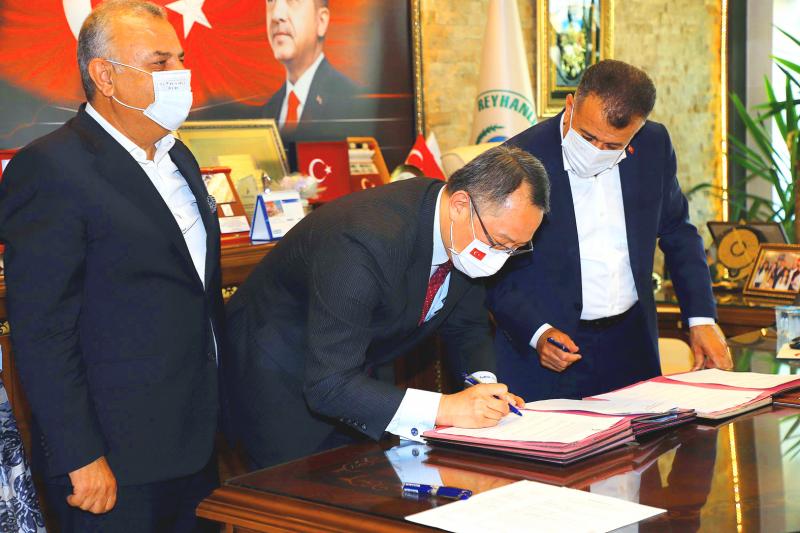The government is to provide an additional US$200,000 to fund the operations of the Taiwan-Reyhanli Centre for World Citizens in southern Turkey, Taiwan’s representative office in Turkey said.
A memorandum of understanding outlining the allocation of the funds to the center over the course of one year was signed on Wednesday in Reyhanli by Representative to Turkey Volkan Huang (黃志揚), Reyhanli Mayor Mehmet Hacioglu and director of the Taiwan Center Chiu Chen-yu (裘振宇).
The funding will allow the center to provide vocational training programs to Syrian women who have fled their country’s civil war, and help them earn a living independently, the Taipei Economic and Cultural Mission in Ankara said.

Photo: CNA
The center will also produce documentaries to promote humanitarian efforts undertaken in the area by Taiwan in collaboration with Turkey, the representative office added.
Taipei provided US$400,000 for the construction of the center in Reyhanli, a municipality near the Syrian border that has received more than 120,000 Syrian refugees since 2011.
The building, which has 3,000m2 of floorspace, provides shelter for refugees, vocational training, and religious and social activities, the center says on its Web site.
After construction was completed in October last year, the center was transferred to the Reyhanli government, which appointed Chiu, the center’s architect, as its first head.
Reyhanli has been unable to finance the center’s operations, so the government stepped in with funding, the representative office said.
Taiwan is funding the center as a way of contributing to the international community, Huang said.
The Syrian refugee crisis is still an important issue 10 years after the war broke out, and Taiwan will continue to help those forced to leave their homes, he said.
“The responsibility to address the refugee issue should not fall solely on Turkey’s central and local governments,” Huang said, adding that “every country in the world should lend a helping hand.”

The Grand Hotel Taipei on Saturday confirmed that its information system had been illegally accessed and expressed its deepest apologies for the concern it has caused its customers, adding that the issue is being investigated by the Ministry of Justice Investigation Bureau. The hotel said that on Tuesday last week, it had discovered an external illegal intrusion into its information system. An initial digital forensic investigation confirmed that parts of the system had been accessed, it said, adding that the possibility that some customer data were stolen and leaked could not be ruled out. The actual scope and content of the affected data

‘LIKE-MINDED PARTNER’: Tako van Popta said it would be inappropriate to delay signing the deal with Taiwan because of China, adding he would promote the issue Canadian senators have stressed Taiwan’s importance for international trade and expressed enthusiasm for ensuring the Taiwan-Canada trade cooperation framework agreement is implemented this year. Representative to Canada Harry Tseng (曾厚仁) in an interview with the Central News Agency (CNA) said he was increasingly uneasy about Ottawa’s delays in signing the agreement, especially as Ottawa has warmed toward Beijing. There are “no negotiations left. Not only [is it] initialed, we have three versions of the text ready: English, French and Mandarin,” Tseng said. “That tells you how close we are to the final signature.” Tseng said that he hoped Canadian Prime Minister Mark Carney

POSITIVE DEVELOPMENT: Japan and the US are expected to hold in-depth discussions on Taiwan-related issues during the meeting next month, Japanese sources said The holding of a Japan-US leaders’ meeting ahead of US President Donald Trump’s visit to China is positive news for Taiwan, former Japan-Taiwan Exchange Association representative Hiroyasu Izumi said yesterday. After the Liberal Democratic Party’s landslide victory in Japan’s House of Representatives election, Japanese Prime Minister Sanae Takaichi is scheduled to visit the US next month, where she is to meet with Trump ahead of the US president’s planned visit to China from March 31 to April 2 for a meeting with Chinese President Xi Jinping (習近平). Japan and the US are expected to hold in-depth discussions on Taiwan-related issues during the

President William Lai (賴清德) yesterday bestowed one of Taiwan’s highest honors on Saint Vincent and the Grenadines (SVG) Ambassador Andrea Clare Bowman in recognition of her contributions to bilateral ties. “By conferring the Order of Brilliant Star with Grand Cordon on Ambassador Bowman today, I want to sincerely thank her, on behalf of the Taiwanese people, for her outstanding contribution to deepening diplomatic ties between Taiwan and SVG,” Lai said at a ceremony held at the Presidential Office in Taipei. He noted that Bowman became SVG’s first ambassador to Taiwan in 2019 and